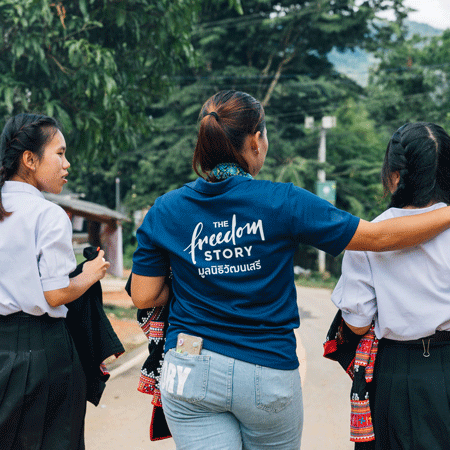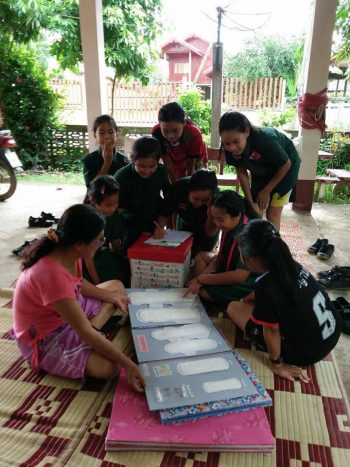
Segurança e bem-estar
Segurança e bem-estar, Poder da juventude
“Como os adolescentes e seus pais reagem quando você compartilha informações sobre saúde sexual e reprodutiva?”
Enquanto faço essa pergunta, P'Pan, Diretor de Programação em Khiang Rim Khong, se aproxima com três enormes fichários e os coloca na minha frente. Abro o primeiro, sem esperar encontrar 60 tipos diferentes de preservativos colados nas duas páginas.
Olho sem jeito para a exibição de preservativos criativos e a equipe cai na gargalhada.
Minha criação paquistanesa não me preparou para isso, ou para o segundo livro: um pop-up, que abre com um desenho ampliado de genitália masculina. Ou o terceiro, que é um desenho ampliado de genitália feminina.
“É assim que abordamos a conversa!”, diz Phuangthong Takan. Ela é a fundadora do Child Rights Protection Center, um parceiro da GFC que incubou Khiang Rim Khong. “Começamos brincando sobre sexo com os adolescentes, eles são sempre tímidos e isso quebra o gelo!”

O Child Rights and Protection Center e o Khiang Rim Khong trabalham por meio de escolas e divulgação independente em festivais e mercados para compartilhar informações muito necessárias sobre saúde reprodutiva e direitos. Na tranquila cidade de Chiang Khong, no nordeste, onde eles trabalham, esse é um tópico de conversa novo e frequentemente desencorajado.
Eu lhes digo que no Paquistão, onde cresci, capítulos sobre saúde reprodutiva foram cortados dos livros didáticos devido ao medo de que o conhecimento levasse a mais promiscuidade.

“Aqui tem sido a mesma coisa”, Phuangthong me conta, “mas vemos essa mentalidade mudando lentamente agora com os jovens. Eles encontrarão informações online, mas queremos ter certeza de que estão obtendo as certo Informação."
A equipe do CRPC e do KRK é acessível, amigável e disponível para os jovens que vêm até eles com perguntas ou preocupações. Nos estados do nordeste, há taxas mais altas de infecções sexualmente transmissíveis, incluindo HIV, devido a uma série de razões – incluindo a movimentação de pessoas entre as fronteiras e a prevalência do turismo sexual, bem como a falta de conhecimento e recursos culturalmente apropriados nas áreas remotas.
A presença consistente do CRPC criou confiança entre os jovens que eles atendem, incluindo migrantes e refugiados, muitos dos quais agora são educadores de pares e mentores em suas comunidades. Eles esperam continuar criando esse efeito cascata de conhecimento por meio dos múltiplos stakeholders com os quais trabalham.
O CRPC também trabalha em estreita colaboração com Centro para Meninas, outro parceiro da GFC que trabalha para capacitar meninas e prevenir o tráfico na região da fronteira.
A equipe é de fala mansa, mas corajosa – sair e compartilhar panfletos sobre saúde reprodutiva e distribuir preservativos em festivais em um canto bastante conservador e tranquilo do país requer tenacidade e coragem. Eles compartilham histórias de sucesso, de obstáculos, aprendizado e crescimento. Todos vêm trabalhar motivados por experiências pessoais e um desejo de ver o mundo mudar para suas gerações futuras, e isso me lembra o quanto todos nós temos em comum.
